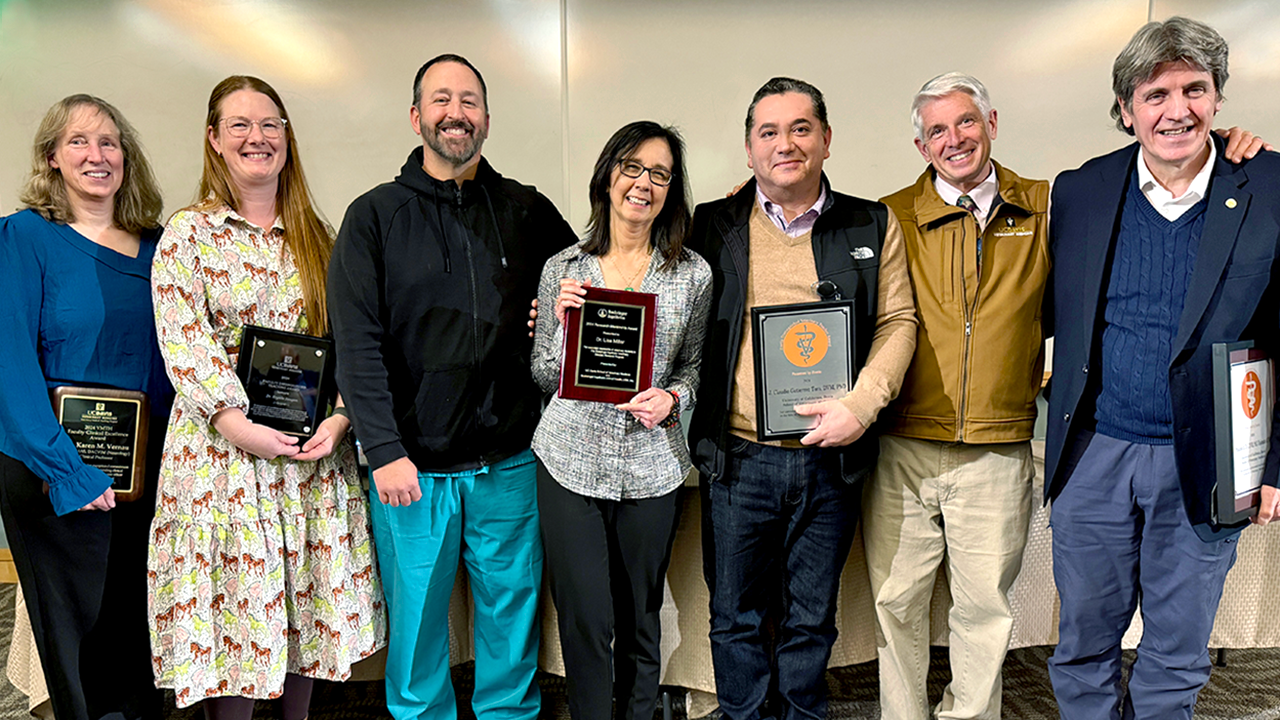
2024 Faculty Awards
Several faculty members were honored at the inaugural Stars of SVM Staff and Faculty Award Reception on Thursday, November 14.
Each of the recipients exemplify excellence in supporting the mission of the school—advancing the health of animals, people and the environment—through educational, research, clinical and public service programs.
Congratulations to this year’s winners!
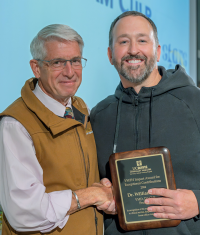
Dr. Bill Culp was honored with the VMTH Impact Award. This is a new award that is not given annually, but on an ad hoc basis as determined by VMTH leadership for individuals that demonstrate exceptional contributions to the VMTH.
Culp was selected as a Founding Fellow of Surgical Oncology by the American College of Veterinary Surgeons (ACVS) in 2012, an ACVS Founding Fellow of Minimally Invasive Surgery in 2017 and an ACVS Founding Fellow of Oral and Maxillofacial Surgery in 2021. Culp is currently a member of the Soft Tissue Surgery service with interests in many areas of soft tissue surgery, but his major focuses are surgical oncology and interventional radiology.
Culp is a world leader in his field and his skills and expertise are highly sought after. But he received this award for his dedication to maintaining patient care, resident training and his all-around exceptional collegiality at the VMTH.
In presenting Culp with his award, Dr. Kate Hopper said: “We have experienced a period of low faculty coverage in the soft tissue surgery service and Dr. Culp has gone above and beyond to ensure we can continue to provide patient care. It does not matter how busy we are, how stressful the situation is, what time of day or night it is, Bill is always happy and positive. He is highly supportive of the VMTH House Officers, both on his service and others. He is always approachable and wants to help in any way possible. Bill makes an invaluable contribution to patient care and the morale of the VMTH community and for these reasons we wanted to recognize him with this award.”
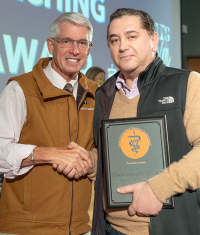
Dr. Claudio Gutierrez was awarded the Zoetis Faculty Teaching Award for his dedication to the development and improvement of instruction in the anatomical sciences and his unparalleled support and mentorship of veterinary students. As an Associate Professor of Anatomy, Physiology & Cell Biology, he provides instruction in the gross anatomy of all canine body systems and comparative anatomy of large animals.
His teaching quantity far exceeds both departmental and school averages. He consistently received high ratings in student evaluations; for example, he received a near-perfect score of 4.9/5 for the academic year of 2021-2022. Students note his enthusiasm, passion for anatomy, approachability, and willingness to go the extra mile to help with understanding and recall of concepts.
“Dr. G is admired by the students for his knowledge of veterinary and clinical anatomy, which is beyond encyclopedic. But more importantly for his passion, patience, and engagement. I have witnessed firsthand how the students listen word-by-word the laboratory demos, his explanations, and descriptions from the most basic to the most complicated anatomical structures,” said Dr. Lillian Cruz-Orengo, associate professor in Neuroimmunology.
Gutierrez played a pivotal role in revising anatomical content after the restructuring of the DVM curriculum in 2011 which had resulted in reduction of the time allotted for anatomical instruction, by revising syllabi, lectures, and lab sections. His focus on optimizing student learning is demonstrated by his continuous development of teaching aids and course materials.
He has contributed in a number of ways to improve instruction in anatomy and dissections. He curated a catalog of video dissections and 3D video tours that students consistently find helpful to study prior to lab. Published in the journal Animals, he optimized a technique for preserving and facilitating plastination in anatomical specimens by impregnating them with polymers, which improves on a previously established technique. He is currently curating a feline anatomical atlas which is a collection of images describing feline anatomy from performing a series of feline cadaver dissections.
As an instructor in the Summer Enrichment Program (SEP) which provides students from disadvantaged backgrounds opportunities to enhance their veterinary school applications, as well as in the Summer Math and Science Honors (SMASH) academy at UC Davis providing high school students from traditionally underrepresented communities access to hands on UC Davis STEM classes over the summer, Gutierrez tirelessly dedicates himself to mentorship and fostering learning of students across all ages and backgrounds.
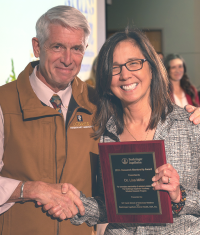
Dr. Lisa Miller was recognized with the Boehringer-Ingelheim Excellence in Research Mentoring Award for her dedication to developing the careers of the next generation of scientists through mentorship of students in her lab, as an instructor in both the graduate and veterinary curriculum, and as an advisor in two graduate groups. A Professor of Anatomy, Physiology, and Cell Biology, and Core Scientist and Unit Leader for the Respiratory Disease Center at the California National Primate Research Center (CNPRC), Miller has made a profound impact on the career trajectories of undergraduate, graduate, and postdoctoral trainees alike.
Miller’s strong and well-funded research program investigates the impact of environmental stressors on mucosal immunity and lung development in perinates, and how this makes adults susceptible to chronic airway disease. One of her roles at the CNPRC is to create a collaborative hub for investigators to use non-human primates as a research model, and through this role she interacts with a wide range of scientists to provide invaluable training and mentorship. She has mentored 16 undergraduate students (many of whom have gone on to pursue Ph.D.s, MDs, and VMDs), 2 veterinary students as part of the summer research STAR program, 6 postdoctoral fellows, and graduated 7 Ph.D. students as a member (currently chair) of thesis committees.
Current graduate student Chloe Chou at the University of North Carolina at Chapel Hill, who was previously mentored by Miller as an undergraduate, said, “Dr. Miller excels at mentoring students with initiative and pushing for their career development. Throughout my time in her lab, Dr. Miller built my confidence as a researcher by displaying trust in my abilities, allowing me the freedom to explore novel methods, learn from mistakes, and eventually lead a significant project.”
Through serving as an academic graduate advisor in the Pharmacology and Toxicology graduate group, Miller works with five mentees to formulate course plans, approves members for the qualifying exam, and poses as a general source of guidance in their studies. As the Master Academic Advisor to the Integrative Pathobiology graduate group, she directly advises all master’s students and coordinates the activities of all faculty advisers.
Miller’s mentoring extends even to the classroom, as she teaches in the gross anatomy laboratories in VET 403 and VET 404. Students note that she is a helpful, supportive, and enthusiastic instructor who takes time to patiently explain difficult material. She gives lectures in several graduate programs, including Immunology, Integrative Pathology, and Pharmacology and Toxicology. Her graduate elective course in immunotoxicology, developed in collaboration with Professor Allison Ehrlich of the department of Environmental Toxicology, was very highly rated.
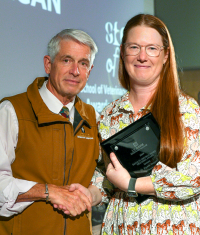
Dr. Krystle Reagan was recognized with the Faculty Distinguished Teaching Award for her innovative and effective teaching in several didactic courses in years 2-4 of the DVM program, as well as clinical instruction. She serves as an Associate Professor of Small Animal Internal Medicine and co-Director of the Veterinary Center for Clinical Trials, where she also demonstrates excellence in teaching and mentorship.
Her teaching load includes year 2 courses VET 410, VET 413, VET 414, year 3 courses VET 432C, VET 433A, VET 433C, and year 4 course VET 442, as well as clinical instruction as assigned to the Small Animal Internal Medicine Service. Her overall student evaluation scores (4.7/5) are above an already laudatory departmental average of 4.6/5.
Students especially note and appreciate her clear learning outcomes and ability to aid in learning difficult concepts with the support of case examples and innovative approaches. She has developed high quality teaching materials and tools, including an interactive website and multiple case presentations to help students grasp concepts for long term memory. She has also integrated introductory sessions in artificial intelligence in the DVM curriculum, a novel topic that is rapidly increasing in relevance.
One student from VET 413 commented, “Your learning objectives were clearly described and lectures were always easy to follow, with enough information to achieve mastery of the learning objectives during self-study. I appreciate the way you organize your material and the clarity with which you present the concepts. Thank you for a great learning experience.”
A student from VET 433C said, “I always love learning from Dr. Reagan. Her lectures are very engaging and interactive. She does a great job of taking a complicated topic and distilling it down to its key points and what to look out for as practitioners.”
In the clinical setting, students mention her ability to set students at ease in a difficult learning environment, provide a relevant framework for their learning, and encourage them with personal stories of growth. She was recognized as the Best Small Animal Professor by the class of 2023. She also serves as a supportive mentor who provides guidance to house officers, graduate students, and other trainees.
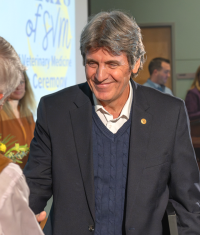
Dr. Francisco (Paco) Uzal was honored with the Zoetis Veterinary Research Award for his outstanding research achievements in clostridial diseases and animal models of clostridial infections. As Professor of Pathology, Microbiology & Immunology and branch chief of the California Animal Health and Food Safety Laboratory at San Bernadino, Uzal has devoted nearly 30 years to studying pathogenesis of clostridial infections and led the animal model component of an NIH-funded research program spanning more than two decades. During the last three years, Uzal has authored 85 publications with 36 studies focusing on Clostridium species and clostridial toxins, in the form of experimental studies or reports of naturally occurring clostridial disease outbreaks in animals.
Clostridia are common bacteria often inhabiting the gut, encompassing several human pathogens such as C. difficile, which contribute to more than 30,000 human deaths a year and pose a significant risk for animals. Through his research, Uzal has contributed significantly to pathogenesis, diagnostics, therapeutics, and understanding of the clinical impact of clostridial bacteria. He has identified novel clostridial toxins (toxins produced by clostridial bacteria), pioneered a new classification system for C. perfringens toxin types, revealed the mechanistic role of toxins in disease, their mechanism of action, and the triggers that lead to host susceptibility, and developed new tools for diagnosis of clostridial diseases.
Uzal has developed a diagnostic method for separating innocuous bacteria from toxigenic bacteria in enterotoxemia, which is a condition occurring in nearly every species of veterinary interest and caused by absorption of large amounts of toxins produced by C. perfringens. Within the last three years of research, he has focused especially on pathogenesis and clinical sequelae of the C. perfringens enterotoxin and the epsilon toxin. In a 2019 publication, he unraveled the mechanism of how the epsilon toxin penetrates the blood-brain barrier.
Alongside his research contributions in clostridial diseases and infections, Uzal has directed the necropsy program of the California Horse Racing Board for about 15 years, which has led to significant reduction in the number of fatalities due to catastrophic bone fractures in racehorses in California. He is a diagnostic pathologist of the California Animal Health and Food Safety Laboratory System, serving as branch chief of the San Bernadino laboratory since 2016. He mentors residents, new faculty, and staff at the San Bernadino laboratory every day while also sustaining a heavy teaching load in the DVM (block leader- GI), graduate, and resident curricula. In 2023, he advanced to the highest professorial level of University Distinguished Professor and is notably the first veterinary diagnostic pathologist to attain this level in the school’s 75-year history.
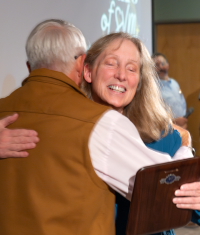
Dr. Karen Vernau received the Faculty Clinical Excellence Award, which was established in 2014 to honor professorial or staff veterinarians at the UC Davis veterinary hospital who demonstrate exceptional, sustained, and significant achievements in patient care, clinical instruction, and advancing clinical veterinary medicine. It recognizes veterinarians whose ability, dedication, character, and leadership contribute significantly to the excellent reputation of hospital clinical programs.
Vernau serves a 70% clinical position in one of the most demanding services in the VMTH. She provides expert care for a high volume of neurologic and neurosurgical patients, including emergency cases requiring 24/7 attention. Her expertise in neurology and neurosurgery and her leadership in feline neonatology have significantly advanced the service's capabilities.
While Vernau works tirelessly at her day job as a neurologist, she consistently takes on all sorts of other roles and duties. She is highly regarded for her dedication to both student and resident training and creates a supportive learning environment that fosters critical thinking and clinical reasoning.
Vernau has been a superb ambassador for the SVM at almost every level of outreach within the Small Animal clinic. She has developed a specialty area of feline neonatology within the VMTH, the Feline Pediatric Service, that has transformed clinical care of neonatal cats to a level not previously present in the hospital. This has continued to a national and international level, optimized clinical outcomes and rehoming success for kittens, and created a new standard of care for these patients.
Through research in feline pediatric health issues, such as hypothyroidism and hydrocephalus, Vernau has garnered national and international recognition. Locally, she has had leadership roles in the Orphan Kitten Project, developed the fracture management program, is a constant volunteer for the Knight's Landing One Health Center, and an advocate for access to care. These roles have led to outreach and strong relationships with shelter and rescue programs that both serve the community and provide teaching cases for veterinary students and house officers.
Read About Dean's Staff Awards presented at this event.
